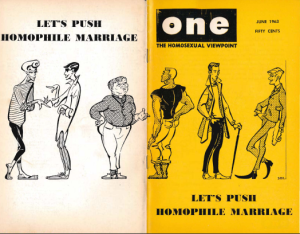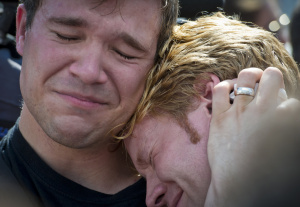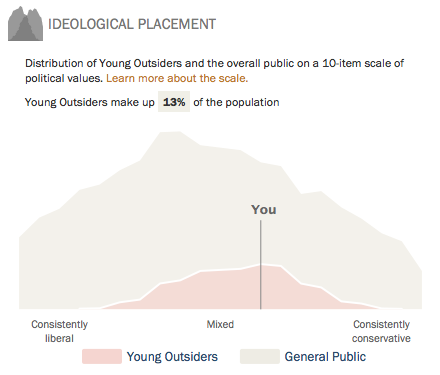Andrew Sullivan's Blog, page 212
July 15, 2014
The Best Of The Dish Today
#ZionStandUp for Israeli @ashlisade: “Kill Arab children so there won’t be a next generation” https://t.co/jr11iwxNUF pic.twitter.com/2hSZAwyMuJ
— David Sheen (@davidsheen) July 10, 2014
The great thing about a blog is that in real time, you can amend and clarify your thoughts. So a couple of things about my long post today about the history of gay America in the last few decades. The title was meant to be a way of reminding everyone that AIDS was absolutely instrumental and central to all of it. That’s all. I believe that there can be no history of gay rights which isn’t in some ways a history of the plague. But, of course, it doesn’t sum up all gay history. My post was prompted by two remarkable pieces – Walter Armstrong’s and Tim Murphy’s – and they are both centered on gay men.
I just want to make clear that I was not intending in any way to erase the critical and central contributions of lesbians in this movement and in the AIDS crisis, which are indisputable. I wanted merely to tell the story from the gay male perspective, because that is where the plague hit hardest, and that is what I can write about personally. So please do not mistake it for a balanced history; it is more of a memoir of a movement and its extraordinary twists and turns.
I don’t know why but I have felt its weight this summer very acutely, perhaps because it seems so remote from so many today, and I cannot but feel, like many in my generation, as if I need to write this down in case people forget it. (I did already, of course, but long ago now.) Even in Provincetown, a place devastated, waves and waves of gay men arrive today for whom it means close to nothing. And the emotional bond of those years makes reading histories of the movement that simply erase it before 2008 not just frustrating; but some kind of assault on what we did and how we did it. An assault on my loved ones, so many of whom are no longer here.
Anyway … we covered a lot of other ground today as well. The conflict in Gaza kept coming up – and readers pushed back in defense of the Israelis, even as I tried to explain my serious moral qualms. (The tweet above, for example, is one of countless collected by David Sheen of teen Israelis making duck faces and calling for the genocide of Arabs. Yes, genocide. In bikinis. And you thought Max Blumenthal is making it up?) Plus: an amazing beard of the week; all the accents in the British Isles; and the strange low-but-high voice that straight guys use when chatting up women.
The most popular post of the day was “Understanding The Permanence Of Greater Israel“, followed by “The Astonishing, Actual History Of The Gay Rights Movement.”
Many of today’s posts were updated with your emails – read them all here. You can always leave your unfiltered comments at our Facebook page and @sullydish. 17 more readers became subscribers today. You can join them here - and get access to all the readons and Deep Dish - for a little as $1.99 month. One writes:
I don’t pay for the LAT or NYT or WSJ or WaPo, or any newspaper, but I pay for my Dish
subscription. I think, at a very cursory level, it’s probably because I find the big newspapers to be very commoditized and the Dish is, well, unique. However, it wasn’t till I read this long piece in the Columbia Journalism Review about Jeff Bezos’ efforts to transform the Washington Post, that a few things really clicked within me about what makes The Dish unique and worth paying for compared to these mainstream publications. First, even though that linked piece is long, it can be summed up with a few snippets from it:
Editors and reporters talk about the Post becoming a “global” paper. They say that the Post will create a news “bundle” that will repackage all the elements of the print newspaper in a way that readers will pay for in digital form. Using tablets and other devices, Bezos aims to recreate the intimate, cohesive, and somewhat linear consumption experience of old media in a way that makes sense for digital…. An editor added: “I think Bezos wants us to be everything for everyone, the same way Amazon is.” …
The journalism isn’t what he (Bezos) plans to revamp, or necessarily invest significant new funds in—the new hires notwithstanding—at least initially. His main focus is the pipeline: reaching the maximum number of customers by putting the Post’s journalism in a package (a tablet, a mobile site) that will draw the greatest number of readers.
It’s pretty funny right? The “journalism isn’t what he plans to revamp.” Rather, Bezos just wants to figure out how to get as many people as possible to read this thing in digital format, rather like a candy company pushing its latest confection. Perhaps, if they truly stepped back and evaluated the shoddy essence of the core product – the, ahem, journalism – they might realize that their product quality is no longer good enough to convince customers to pay for it. In my mind, that is absolutely the difference between the Dish and the major dailies.
A soul and a conscience – all institutions, big and small, need them to be have real credibility and relevance with whom they seek to serve. And especially those that seek to inform and explain the world to us in a democracy so that we may do our part as citizens. The Dish has both, which is why it is worth paying for.
Subscribe here and see you in the morning.



The Astonishing Actual History Of The Gay Rights Movement
[Re-posted from earlier today]
I don’t care for the “right side of history” argument with respect to gay rights for a few reasons. It’s horribly condescending to people who have a sincere view against gay equality; it presupposes some sort of inevitability where there isn’t any; and it fails to understand the nature of history. History is never as dull as the concept of “progress” would have you believe. It is always, as Oscar Wilde once put it, crowded with incident.
In no case is this truer than for gay America. Our story, if presented as a Hollywood screenplay, would be dismissed as too outlandish, too melodramatic and implausible, to be taken seriously. And yet it happened, and remains with us – so close it is hard to see it, and with several sharp twists and turns.
 From the extraordinary repression of the 1950s – the McCarthyite era when all gay people were threats to the republic – to the liberation of the 1960s and the frenzied libertinism of the 1970s, you had one powerful narrative. After centuries – no, millennia – of brutal sanctions against the love of one man for another, an unprecedented, ebullient flowering took place. In small enclaves, an openly gay culture began to thrive and express itself with all the understandable abandon of the suddenly free. It was still very much a subcurrent, among so many other social shifts in that era, and was surrounded by hostility and discrimination and stigma. But the sense of outsiderdom partly intensified the joy and the solidarity. The gay ghettoes of the 1970s and early 1980s did not much care about the world beyond them for a while. Freedom – even in one, small place – was exhilarating enough.
From the extraordinary repression of the 1950s – the McCarthyite era when all gay people were threats to the republic – to the liberation of the 1960s and the frenzied libertinism of the 1970s, you had one powerful narrative. After centuries – no, millennia – of brutal sanctions against the love of one man for another, an unprecedented, ebullient flowering took place. In small enclaves, an openly gay culture began to thrive and express itself with all the understandable abandon of the suddenly free. It was still very much a subcurrent, among so many other social shifts in that era, and was surrounded by hostility and discrimination and stigma. But the sense of outsiderdom partly intensified the joy and the solidarity. The gay ghettoes of the 1970s and early 1980s did not much care about the world beyond them for a while. Freedom – even in one, small place – was exhilarating enough.
And then the plague. It is, quite simply, impossible to conceive of a more dramatic reversal. If gay men had finally struggled free from the internalized notion that they were sick, or enemies of God, or all but asking for divine retribution for their sins, that paradigm closed in with terrible, ironic ferocity. What else could explain a plague of that brutality and specificity but the wages of Satanic perversion? Jerry Falwell could not have dreamed of a more perfect scenario. Pat Buchanan, with his usual flair, intoned that the gays had declared war on nature and nature had therefore declared war on them. And in some dark way, many of us were tempted to believe it.
It would be absolutely understandable if gay men had simply collapsed under the weight of this paradigm. Some quietly did, their deaths hastened by shame and self-loathing and anger. “Tell my mother I hate her,” was one of my dying friend’s last wishes, as he languished alone in his hospital bed. My closest friend at the time both showed extraordinary courage in the face of his physical disintegration and yet also  painted on his naked back the words “Diseased Faggot.” The horror of the disease was compounded a million times by stigma. But the plague was also simply terrifying and terrorizing. No one knew what medieval bacteria would suddenly destroy his brain or liver or digestive system. No one knew who would be next.
painted on his naked back the words “Diseased Faggot.” The horror of the disease was compounded a million times by stigma. But the plague was also simply terrifying and terrorizing. No one knew what medieval bacteria would suddenly destroy his brain or liver or digestive system. No one knew who would be next.
I remember the intensified Provincetown summers of the early 1990s, where I had come to learn how to die. Each year, the band of infected brothers would come together and talk medications, buyers’ clubs, and drug trials, and care for the sick and mourn the dying and go to countless memorial services for the steadily mounting dead. (I suspect I will never go to as many memorial services in my seventies, if I last that long, as I did in my early thirties.) Some of us were intermittently crippled by the huge doses of experimental drugs we were then taking to keep the terror at bay. But we got past the nausea and the night sweats and the diarrhea to try and live before we died. We had a ramshackle night club in an abandoned house on Shank Painter Road, which we called the “Love Shack.” And every time you danced there with someone, you lost yourself in the eternal present, acutely aware that they might not come back next year, or you might not. It gave everything an intensity, a vividness, and an astonishingly fearful mindfulness.
Yes, medical progress was there, if tantalizingly distant for more than a decade. But in a perverse twist, as the medical gains fitfully continued, the deaths mounted. The worst year for deaths from AIDS was 1995 in a plague that had begun fifteen years before. And then, just as it seemed it couldn’t get worse, came the bewildering news of the breakthrough in treatments, the joy of those suddenly become Lazarus, and the deeper grief we had put off until the emergency was over. I sank into a deep depression that I subsequently came to understand as survivor guilt. Others – given a new lease on life but utterly bewildered about what to do with it – turned to drugs and sex and oblivion. Someone once observed that the members of ACT-UP after 1996 had three fates: they were either dead, crystal meth addicts or professional AIDS activists. What we had experienced during our most formative years simply made living hard, terribly hard, in the wake of survival.
Walter Armstrong has a wonderfully perceptive piece about this phenomenon that I recommend highly. The sexual oblivion of meth had its greatest appeal and took its greatest toll on the survivors:
Crystal methamphetamine took hold in urban gay communities in the late 1990s, soon after the first effective HIV drugs converted many death sentences and restored our generation to so-called normal life. Caring for the sick, burying friends and lovers, mourning the loss of entire sexual and social networks, and protesting in the streets had consumed much of our youth. Investment in the future, career building, saving money and all the other rigmarole of a middle-class US life had been jettisoned. The end of the crisis also meant an end to the intense sense of purpose and solidarity. Normal life could not compete.
As with other populations struggling with PTSD, a minority was collectively committing suicide, after surviving a war.
All of this was understandable, even predictable, given the powerful pressures crashing in on gay life. What was entirely not predictable is that the survivors also did something astonishing. Using the institutions and self-knowledge and smarts that had somehow defeated the  plague, gay men charted a future when nothing like this would happen again, when gay men would never be parted from their spouses on their death beds, when gay men’s physical and psychological health would never be treated as insignificant, when gay men would never suffer the indignity that so many endured in front of our eyes. And so we built the case for marriage equality and for open military service as a recognition of the self-worth our survival had given some of us, and to pay some kind of tribute to those who had fallen.
plague, gay men charted a future when nothing like this would happen again, when gay men would never be parted from their spouses on their death beds, when gay men’s physical and psychological health would never be treated as insignificant, when gay men would never suffer the indignity that so many endured in front of our eyes. And so we built the case for marriage equality and for open military service as a recognition of the self-worth our survival had given some of us, and to pay some kind of tribute to those who had fallen.
We went, in other words, from about the deepest hole you can imagine to a determination not just to get out of it, but to see the mountaintop in our lifetimes. I do not know exactly where this act of will came from. It was not inevitable. It was, in fact, highly improbable. A few generations of licking of wounds would have been understandable. So would a collective in-turning in grief and pain and memory. But it didn’t happen. And today, we look out at that mountaintop … and may be forgiven for feeling vertigo.
Within the next few years, it is perfectly possible to conceive of an America in which marriage equality exists in every state and in which HIV is on a fast track to disappearance. If I had told my best friend before he died that this would happen in twenty years, his eyes would have widened into saucers. And we talk so much about how this has changed America, that we don’t often examine how it has impacted gay men themselves – how it is possible psychologically and emotionally to have come from such depths to such heights in so short a period of time, and stay sane and balanced and happy.
The younger gay generations know nothing of it, of course.
Because gay kids do not have gay parents, by and large, they have not been told stories of the dark days of courage and cowardice, and of unspeakable devastation and trauma. The average gay 22  year-old today simply assumes that marriage is his civil right, and has only passing interest in how it came about. As for the AIDS years, he is about as informed as the average straight guy. And this is not a bad thing as such. The whole goal of all this ordeal was to create a world with only the trace of a robust equality, and not of lingering and persistent pain.
year-old today simply assumes that marriage is his civil right, and has only passing interest in how it came about. As for the AIDS years, he is about as informed as the average straight guy. And this is not a bad thing as such. The whole goal of all this ordeal was to create a world with only the trace of a robust equality, and not of lingering and persistent pain.
And yet the trauma of plague still reverberates in our heads – and that includes the young as well as the old. Sex for most of us has always been synonymous with fear – and that fear has had remarkable resilience over the decades, even as the reasons for it have waned. In another new must-read, Tim Murphy shows how this overhang is still with us, even for those who never went through the trauma of the worst years:
Over coffee and pie at the Blue Stove in Williamsburg not long ago, Adam, 33, a writer and filmmaker I know, mentions that he is exactly the same age as the pandemic. “The terror was at its height when I was coming of age, postpuberty,” he says. “The message from TV shows that was drummed into us as gay boys was that we could get this disease and die and make our parents very sad. I developed this intense fear when I was having sex with someone and not even doing anything risky. I’d still freak out the next day.”
And, of course this did not just make all sex fraught with anxiety on both sides, it also divided us into two camps, the positive and the negative. For a while, I vowed never to date someone negative, and sought sex partners online via HIV-positive sites. And within the HIV world, I often left condoms behind, as impediments to the full sexual intimacy I craved and to the HIV solidarity rubber-free sex generated. And then I was famously dragged out in public and shamed for this by HIV-negative activists who opposed my politics. It was a sign that the negative-positive divide was still deep and  occasionally vicious. It still is. On the hook-up and dating apps, you see the following phrases all the time: “Drug/Disease-Free For Same”; “Clean”; “Negative for Same”. Since no one has tangible instant proof of being HIV-negative, it’s not particularly effective in HIV prevention. But it instills the divide that has stalked gay men during the plague and after.
occasionally vicious. It still is. On the hook-up and dating apps, you see the following phrases all the time: “Drug/Disease-Free For Same”; “Clean”; “Negative for Same”. Since no one has tangible instant proof of being HIV-negative, it’s not particularly effective in HIV prevention. But it instills the divide that has stalked gay men during the plague and after.
But that too is now collapsing. The revolution of the last couple of years is a Rubicon. We now know that any HIV-positive man on meds is no more infectious than someone who is HIV-negative. We also know that an HIV-negative man who is on Truvada cannot get infected. This means that there is no more HIV divide in the gay world – or rather that its empirical basis has just been completely erased. Which means, quite simply, that gay men for the first time since 1981 can live without fear of HIV if they so wish.
And this of course is just one more bewilderment. As we adjust to marriage equality and all that comes with it, we are suddenly offered the chance for an infinitely less anxious and less dangerous sex life as well. Men whose entire sexual identities have been wrapped, literally, in rubber, now have to navigate an entirely new world. Of course there is resistance:
Another HIV longtimer—a Chelsea store manager named Steve, 58, diagnosed in 1996—tells me frankly that, though he supports Truvada usage in theory, it mostly just pisses him off on a visceral level.
“I was at the Eagle a couple months ago,” he says, referring to the West Chelsea leather bar, “and this hot little muscly Latin guy told me that he was on PrEP and that I could fuck him raw. Boom, he just said it so easily.” Steve has lost many people he loved to AIDS. He finds even the effervescent celebrations of Gay Pride tough to witness. “I want people to understand why they’re able to take this right now,” he says. “It’s on the backs of people who have died and suffered. All that needs to be learned and honored.”
It does indeed. But I have no doubt that the beleaguered gay men of the early 1990s would be amazed and thrilled that we have come this far. They did not die hoping that their legacy would be sustaining fear in future generations for ever.
But bewilderment is not out of place. I think of the year I arrived here, and had to sign a box in my immigration form denying that I was a “communist”, “criminal” or a “homosexual”. In that year, 1984, the AIDS epidemic was just beginning to stalk the land, culling, by the time it  was finally stymied, five times as many young men as died in the Vietnam War in roughly the same amount of time. I remember the exhilaration of coming out in the 1980s and the terror of watching men my own age die horrible, humiliating deaths in front of me. I remember finding out that I was HIV-positive and immediately knowing that, for that reason, I could be deported instantly, and living in America in that limbo for twenty more years, with no guarantee of success. I remember the deaths of my friends and lovers; and the shift in 1996 as long-term survival seemed possible for the first time. And I remember the countless speeches I would give to gay audiences about marriage equality, and the glassy-eyed, incredulous stares that came back at me. I remember my military friends, in constant fear and trepidation, fired at will, struggling to square their often conservative dispositions with a sexual identity that labeled them “queer.”
was finally stymied, five times as many young men as died in the Vietnam War in roughly the same amount of time. I remember the exhilaration of coming out in the 1980s and the terror of watching men my own age die horrible, humiliating deaths in front of me. I remember finding out that I was HIV-positive and immediately knowing that, for that reason, I could be deported instantly, and living in America in that limbo for twenty more years, with no guarantee of success. I remember the deaths of my friends and lovers; and the shift in 1996 as long-term survival seemed possible for the first time. And I remember the countless speeches I would give to gay audiences about marriage equality, and the glassy-eyed, incredulous stares that came back at me. I remember my military friends, in constant fear and trepidation, fired at will, struggling to square their often conservative dispositions with a sexual identity that labeled them “queer.”
I remember … and I forget. I forget because in many ways, forgetting is the only way I can actually live with some measure of freedom from a past that will never let go of me and a future that still blinds with the abundance and clarity of its light. I am not alone. We are on this mountaintop together, even as so many dead lie round.
(Photos: The cover of One Magazine, June 1963; Dr. Richard DiGioia goes to George Washington Hospital to check on his patient, Tom Kane, on September 25, 1992. Kane is deaf. Dr. DiGioia hugs Kane before leaving. By James A. Parcell/The Washington Post via Getty Images; Thousands of people gather to view the AIDS Memorial Quilt on display on the Washington Monument grounds 10 October, 1992 in Washington, DC. By Renaud Giroux/AFP/Getty Images; A couple participates in a symbolic group commitment ceremony for same-sex couples to kick off National Gay Pride Month at The Abbey bar and restaurant on June 4, 2008 in West Hollywood, California. By David McNew/Getty Images; Seth Keel, center, is consolded by his boyfriend Ian Chambers, left, and his mother Jill Hinton, during a concession speech during an Amendment One opposition party on Tuesday, May 8, 2012, at The Stockroom in downtown Raleigh, North Carolina. Amendment One, which would ban gay marriage in the state, was well ahead at the polls. By Travis Long/Raleigh News & Observer/MCT via Getty Images; Former US Army Lt. Dan Choi (L), a gay rights activist and opponent of “Don’t ask Don’t Tell”, arrives at the E. Barrett Prettyman Federal Courthouse March 28, 2013 in Washington, DC. By Brendan Smialowski/AFP/Getty Images; Michael Knaapen and his husband John Becker react outside the US Supreme Court in Washington DC on June 26, 2013. By Mladen Antonov/AFP/Getty Images.)



Face Of The Day
A woman walks through the rain under an umbrella on 5th Avenue in Midtown Manhattan on July 15, 2014 in New York City. A torrential rainstorm poured down, adding to an already above average July rainfall. By John Moore/Getty Images.



Vocal Cords With Character
Emily Mullin describes how developing a voice disorder altered her sense of self:
A few months after the onset of my strange symptoms, I was diagnosed with spasmodic dysphonia, a rare neurological disorder that causes muscle spasms in the vocal cords and affects one to four people in 100,000, according to the National Institutes of Health. The result is choppy, unstable speech quality. I was told there was no cure but treatment was available in the form of voice therapy and shots of botulinum toxin, or Botox, directly into the vocal cords. But even with treatment, my doctor told me that my voice would never be the same again. I had lost my voice.
Like other physical characteristics such as height, weight, and hair color, our voices help identify us.
The sound of our voice influences how other people perceive us—possibly even more than the words we actually say. “Our voice is our ambassador to the rest of the world,” says Dr. Norman Hogikyan, director of the University of Michigan Health System Vocal Health Center. “Often a first impression is based upon a person’s voice.” For people with voice disorders, a part of our identity is stripped away. Our weak voices can be unfairly associated with emotional sensitivity, a lack of confidence, lower intelligence, and sometimes, physical illness.
Meanwhile, Adam Clark Estes discusses how becoming partially deaf affected his relationships with others:
I got pretty good at reading lips. I got great at nodding and smiling. I found myself always retreating into music, because good ear buds would pump sound waves straight past my broken ear drums, past those tiny bones, and straight to my brain by way of the auditory nerve which, luckily, managed to remain intact despite the infections. Bass felt good, because I could feel it.
My reality was a quiet one, peaceful even. The busy streets of Brooklyn never bothered me at night because I simply couldn’t hear the car horns or the garbage trucks. It was easy to stay cool in tense conversations, because it simply didn’t register when people raised their voices. Maybe I did become a little brusque over time. But I was luckier than many people with hearing loss. My right ear was in better shape than my left, and I leaned on it like a crutch. When walking down the sidewalk, I made it a habit to keep people on my right side. I figured out how to get by, but I was constantly thinking about my hearing loss, as I tried to piece together conversations from muffled voices.



23 – 1
As we enter yet another phase in yet another bombardment of Gaza, I find myself nodding my head to much of Roger Cohen’s latest column (he’s been on a splendid roll lately). Part of me doesn’t want to look or write about it, because there is little point. There is even less of a point in actually trying to defend the Palestinians or to express grief that so many are being killed by Western armaments.
Hamas has indeed made itself again a pariah – for its refusal of any cease-fire, for its desperate aggression with its hundreds of largely useless but still traumatizing rockets, and for its cynical preparedness to allow civilians to die in the rubble made by the Israelis, as they “mow the lawn” yet again. On this subject, the world is full of passionate certainty, and it is a fool’s errand to care.
But I cannot help myself, because I do care. And, yes, I’m aware of the now-exhausted arguments about proportionality. We have gone over this once before in the 2009 Gaza war. But my view remains a relatively simple one: when one side has overwhelming military, economic and diplomatic superiority, it is not now and never has been a fair fight or a just war. And the fatalities on both sides prove that in staggering ways:
Max Fisher notes that since January 2005,
when the conflict began to change dramatically, it has killed 4,006 people, of whom 168 have been Israeli and 3,838 Palestinian. That means that, since January 2005, only four percent of those killed have been Israeli, and 96 percent Palestinian. Since January 2005, in other words, the conflict has killed 23 Palestinians for every one Israeli it claims.
That is why when I hear Israeli outrage at the devastation of Israel’s security and peace by the latest Hamas offensive, it sounds to me like over-compensation. Yes, many are indeed traumatized by sirens and drills and rockets. I do not mean to minimize that or the Israeli deaths and injuries – but it is objectively infinitesimal compared with the living terror under which Gazans now live.
And look at the photograph above. Do these Israelis look terrified? They are watching Gaza get pounded into dust from a Sderot mountain. They’re within the rocket range, but they sure don’t look worried. They’ve brought chairs and beer and, yes, popcorn! Mackey has an excellent and devastating report on the atmosphere. When the sound of blasts occur, there is applause. And the same viewing parties happened in 2009, as children were being dragged out of rubble. Yes, Palestinians cheer Israeli deaths. But they have no power. To cheer even as you have overwhelming force and superiority tells you a lot about what has happened to the moral compass in Israel today.
There is also the question of rank ahistoricity in the coverage. Without an understanding of how Israel and Gaza got to this point, it is hard to put it in perspective. A reader puts it well:
Why is it that these seemingly now-routine flare ups of violence are treated as though they were unique situations? It’s always “they did this, so we responded” and an endless tit-for-tat follows until Hamas finally gives up. Rarely does there seem to be an appreciation of the consequences of having created an open-air prison on the West Bank with similar levels of control in Gaza.
I ask Goldblog and your dissenting readers, if not for these rocket attacks, are the Palestinians even relevant to the Israelis in any meaningful sense? The West Bank, in comparison to Gaza, has stayed relatively peaceful, but what does Fatah have to show for it? Ignorance of Palestinian suffering by the Israeli people, endless expansions of settlements, and lives utterly dictated by Israeli policy over which they have no influence. The Arab shopkeepers in Jerusalem staged a very visible protest and nobody cared. And now that Netanyahu has ruled out the possibility of a sovereign Palestine, they also have no future of their own. They are doomed to imprisonment forever, “state” or no “state.”
I keep returning to this article you posted by Max Fisher that early on remarks, “the occupation is wrong, it is the problem, and Israel is responsible.” I think this applies to Hamas’ futile rocket campaigns. I don’t believe that Hamas fires the rockets simply to raise the death toll, although that is probably part of the thinking there. Instead, I view this through the lens of street culture: they are firing these rockets for respect. The occupation is an endless line of indignities that Palestinians are subjected to every day, a fact that barely seems to register among Israelis, and Hamas is demanding they at least look them in the eye as they do it.
Returning to my earlier point, violence is the only case in which they are relevant to their captors, so they fire these rockets as a release, much as an ostracized kid will act out just to be noticed by someone else. They might be dominated in every sense by Israel, but they won’t be reduced to human livestock or a dehumanized “lawn” that must periodically be “mowed” to maintain an illusion of peace. Their lives may be completely dictated by Israel, but at least in this one case, they can defy that rule and be noticed for it – even getting the other side to admit their own powerlessness to truly stop it. Can Fatah claim to have ever gotten the Israeli government to admit defeat in any sense whatsoever? Hamas can.
And so the beat goes on …



July 14, 2014
The Best Of The Dish Today
So I broke down and today carefully took the Pew political typology quiz to determine which segment of the electorate I fit into. I can’t say I found the process that easy. To pick between two ideals, when you really fall somewhere in between both, doesn’t capture quite where you are. But maybe the cumulative weight of 23 answers balances that out. I don’t know. But here’s where I am, according to Pew:
I’m a “Young” Outsider. Here’s how Pew describes them:
This relatively young, largely independent group holds a mix of conservative and liberal views. And while more lean toward the Republican Party than the Democratic Party, Young Outsiders generally express unfavorable opinions of both major parties. They are largely skeptical of activist government, as a substantial majority views government as wasteful and inefficient. Yet many diverge from the two conservative typology groups – Steadfast Conservatives and Business Conservatives – in their strong support for the environment and many liberal social policies.
I’m only going to endorse one aspect that seems completely apposite to my particular case: “relatively young.”
Today, I made the case that Greater Israel is a permanent thing, and that all diplomacy that rests on a two-state solution has become largely pointless. I also assume that this fact will perhaps never be conceded by an American president, let alone the American Congress. So our traditional kabuki dance on this question is fast becoming an eternal one. And the deaths – almost entirely Palestinian – will simply mount and mount.
If you read one summary of the legal arguments for and against the Boehner lawsuit against Obama, check out this one. If you still believe that Iraq is a country, then check out the latest rift between Shi’a and Kurds, even as the Sunni revolution knock on Baghdad’s door. A classic Dish thread on under-tipping has started with gusto; and we covered a rare but real phenomenon – people who die of grief. Plus: a window view from a drone operator Dishhead in Afghanistan.
The most popular post of the day was Understanding the Permanence Of Greater Israel, followed by The Revenge Doctrine, Ctd.
Many of today’s posts were updated with your emails – read them all here. You can always leave your unfiltered comments at our Facebook page and @sullydish. 14 18 more readers became subscribers today. You can join them here - and get access to all the readons and Deep Dish, including our recently released Matthew Vines podcast - for a little as $1.99 month.
See you in the morning.
(Photo: Not a sketch from Monty Python. Police cadets who have completed their training take part in their ‘Passing Out Parade’ in the grounds of West Ham United Football Club on July 14, 2014 in London, England. By Oli Scarff/Getty Images)



Face Of The Day
Reverend Kat Campion-Spall weeps as she celebrates outside the venue after members voted to approve the creation of female bishops at the Church of England General Synod in York, northern England, on July 14, 2014. The Church of England overcame bitter divisions on July 14 to vote in favour of allowing female bishops for the first time in its nearly 500-year history. The decision reverses a previous shock rejection in 2012 and comes after intensive diplomacy by Archbishop of Canterbury, Justin Welby. By Lindsey Parnaby/AFP/Getty Images.



Dissent Of The Day
A reader takes a stand:
There are a lot of great things about The Dish, and I was happy to be part of the initial subscription wave. But you just reminded me again why I refuse to re-subscribe. It is your persistent, deplorable habit of using terms like “Baby Boomer”, “Gen X”, and “Millennials”. These terms are utter nonsense. They are preposterous, deeply-misleading sweeping generalizations, grotesque caricatures of reality. There is no such thing as a so-called “generation” except in the strictest biological/anthropological sense, within kinship lines. The use of such terms as social descriptors has been a disaster for our discourse. (One need only look at the wave of idiotic “generation” articles pouring out of Salon for confirmation of this.)
You say every issue is discussed on The Dish? This one evidently can’t be. I have never seen any discussion challenging the ludicrous concept of “generational traits”. That seems to be strictly off-limits.
These so-called “generations” you assert the existence of cannot be defined coherently.
Each “generation” is wildly diverse and contains tens of millions of individuals, saints, sinners, and everyone in between. Yet certain people seem to think – wrongly – that they “know all about” others because they know what year these people were born in!Moreover, each “generation” contains tens of millions of individuals with unique biographies. (And yes I do need to emphasize that.) These individuals have interacted with a whole host of other humans, very many of them of other so-called “generations”, in deeply complex patterns of reciprocity. These individuals have been shaped by the whole of the human biological and cultural inheritance. They did not grow up in some sort of generational isolation box. Please stop slapping labels on them, as if they were figures in a bad editorial cartoon.
As a former history teacher and (minor) historian, it almost makes me grimace when I see such terms used to explain the nature of human society. Nothing could be more misleading. It’s as if we asked a 10 year-old how we can explain human history and society and he replied, “Well, it all depends on what year you were born in. That’s what makes you what you are. People born in 1944 are WAY different than people born in 1946. People born in 1957 are WAY different than people born in 1965.” We’d smile at such childishness – and then watch as a lot of adults make exactly the same childish arguments. It’s time to put away this childish nonsense.
I guess since I was born in 1952 and am routinely lumped together with 76 million other Americans as a so-called “Baby Boomer” that I am more sensitive to this phenomenon. In Esquire magazine, Paul Begala called people like me “locusts”. (I’d like to see Begala call my 59-year-old wife, a woman who has borne inconceivable burdens in her life and shown heroism on many occasions, a locust to my face. He would regret it.) The Atlantic said that people like me “ruined everything”, thus casually negating the lives and careers of millions of dedicated individuals. (Let’s Dick Cheney, born in 1941, off the hook, too.) Imagine such descriptions being made about a group other than the so-called “Baby Boomers”. What kind of speech would they be considered? (BTW, I’m sick and tired of insults, not by you, directed toward the so-called “Millennials”. A lot of my 20-something former students are my friends.)
I want to be judged for my own successes and failures. Please stop assuming you know me, Andrew: you don’t. Please stop assuming that I’m just like everyone else in some mythical, arbitrarily-defined group that supposedly encompasses everyone born between 1946 and 1964. I’m not. OK? When you’re ready to do that, I’ll be ready to come back.



The South-Of-The-Border Crisis

In a must-read counterpoint to the media narrative that the Central American children pouring across our border are fleeing gang violence, Saul Elbein argues that the problems in Guatemala are far more extensive. He paints a picture of a failed state offering a veneer of legitimacy to a corrupt, feudal “deep state” that maintains itself through violence and exploitation:
The only model of power that exists in Guatemala is … terroristic, extra-legal, and dominated by violence. So is it any surprise that after the war, on the streets—where people grasped for the scraps that weft, where children grew up with no chance at wealth and less at respect—pirate organizations like the MS-13 grew? What we’re seeing in Guatemala is not quite, in other words, a crime wave. It’s simply the way things have been there for a long time, pushed to the next level. If you are a civilian there, beneath the labels—soldier; gangster; policeman; army; cartel—is but one underlying reality: men with guns who do what they want and take what they want. Your options are to buy your own security and gunmen; to join a gang yourself; or to leave.
And so many leave.
Meanwhile, Central American migrants are now being barred from Mexican cargo trains:
On Thursday, a freight train derailed in southern Mexico. It wasn’t just any train, though:
It was La Bestia—”the Beast”—the infamous train many Central American immigrants ride through Mexico on their way to the United States. When the Beast went off the tracks this week, some 1,300 people who’d been riding on top were stranded in Oaxaca. After years of turning a blind eye to what’s happening on La Bestia, the Mexican government claims it now will try to keep migrants off the trains. On Friday, Mexican Interior Secretary Miguel Ángel Osorio Chong said in a radio interview that the time had come to bring order to the rails. “We can’t keep letting them put their lives in danger,” he said. “It’s our responsibility once in our territory. The Beast is for cargo, not passengers.”
In light of the situation, Keating advocates a major rethink of how we respond to chaos in Latin America, not to mention our own role in creating it:
I don’t claim to have an immediate fix for Central America’s ills, but surely there are more creative strategies out there than pouring money into a failing drug war and then walling ourselves off from the victims. Latin American issues tend to get shortchanged in the U.S. foreign policy conversation relative to more remote regions. I suspect this is part of the reason why Central America’s instability is only garnering attention now that the consequences of it have quite literally arrived at our doorstep.
On a broader level, the crisis should be a reminder that the U.S. is not immune from events to its immediate south. We’re an American country—in the regional sense of that word—and it’s time to start thinking like it.
(Photo: Central American migrants boarding the “La Bestia” train. By Pedro Ultreras.)



On Immigration Reform: Republicans vs Republicans
Noah Rothman flags a survey by a Republican polling outfit that finds large majorities of Republican voters in key states in favor of immigration reform:
86 percent of self-described Republicans and 79 percent of independents in those 26 states said that the immigration system is in need of fixing. Moreover, 79 percent of Republican respondents said that it was “important” for Congress to act on immigration reform this year. … In worse news for opponents of immigration reform, voters do not believe that the argument that President Barack Obama would not enforce border security provisions in an immigration bill is a valid reason for opposing reform. 72 percent of all respondents said did not believe that concerns over enforcement of border security was a good reason for rejecting immigration reform, including a majority of Republicans and 69 percent of independents. The Harper survey found that nearly two-thirds of all voters and 54 percent of self-identified Republicans support a pathway to legal status for illegal immigrants.
And yet Republicans in government remain committed to stonewalling. Vinik takes them to task:
If Republicans object to [Obama's request for $3.7 billion in emergency funds], what exactly do they propose instead? How should we move through the huge backload of cases? Where should we hold the unaccompanied minors in the meantime? And how should we pay to transport them to their home countries?
Reforming the 2008 law, as Republicans want, could help relieve pressure on the immigration system, but it could cause children who qualify—or who should qualify—for asylum to be turned away. Even so, there are more than 50,000 unaccompanied minors in U.S. custody. Tweaking the law will not suddenly alleviate the problem.
But Tomasky knows exactly why they are doing this:
We’ve all seen this movie way too many times. I don’t know what the Republicans will end up doing here, but it will be dictated by the usual two factors. First, the outrage of the base. It’s cranking up already—oppose Obama here, or you will get a primary. That’s what drives nearly everything in the congressional GOP now. (By the way, what might Lindsey Graham be saying if his primary, rather than having turned out favorably for him already, were next week?) And my it’s heartening, isn’t it, to think that the House Republican caucus is going to follow the moral lead of the Texas delegation on this?
The second factor will be their internal polls. … If the polls now tell them very clearly that most voters—let’s refine that; most likely 2014 voters—are going to blame them for the irresolution of this problem, they’ll compromise. Otherwise, they will oppose. That’s the extent of it.
Previous Dish on the Republican response to the border crisis here and here.



Andrew Sullivan's Blog
- Andrew Sullivan's profile
- 153 followers










